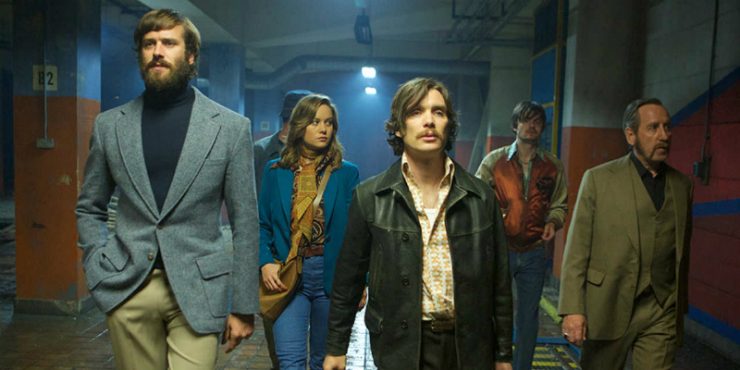Martin Scorsese is a popular filmmaker because he has an innate sense of editing and timing, particularly with regards to tension and character; and also because he, for all intents and purposes, created the Soundtrack Movie. Now, Scorsese is considered one of the great filmmakers of all time for a different reason. He, more than any director before him, seemed to have an understanding of the nature violence plays within our entertainment. The violence in his films is harsh, exciting, and even sensual at times. He understood the spiritual, symbiotic relationship between fear and intrigue when it comes to watching acts of violence. No one wants to get punched in the face, but we’ll cheer the hero as he lands one of those meat-packing fists into the bad guy’s snout. Scorsese is a credited executive producer on Free Fire from director Ben Wheatley. I don’t know if I’ve seen a film that so thoroughly encapsulates Scorsese’s cinematic dichotomy, while still creating such a clear, unique voice. Free Fire is bloody, pulpy fun, but also something that leaves the audience accountable for what they’re watching.
A lot of people could probably watch Free Fire and think of Tarantino’s Reservoir Dogs. Both films spend a grand majority of their time in a creaky, decaying warehouse, and both movies have the same dangerously addictive mix of brutal violence and cheeky humor. The film’s script, written by Wheatley and his usual writing partner Amy Jump, is a feisty one-act thrill which takes place on a seemingly random night in 1978 Boston. The specific setting gives the film a chance to flash hilariously fluorescent suits and a classic rock soundtrack, but the truth is that the plot of Free Fire could take place at any time, anywhere. Its story is a pretty universal tale of the senselessness of criminality and violence in general. Two groups meet to complete a rather standard transaction, but the mix of weapons, ego and stakes sends the night into a stand-off, with bullets whizzing right and left, shooting out knee caps and ripping holes in shoulder pads. The night’s explosiveness proceeds and worsens only because of those handling the weapons. Free Fire is a testament to how there is no species less qualified to handle firearms than the human race.
Cillian Murphy plays Chris, an IRA member who, along with his partner Frank (Michael Smiley), decides to invest in automatic rifles. For the purchase, they hire Frank’s junky brother-in-law, Stevo (Sam Riley), and Stevo’s dim-witted friend Bernie (Enzo Cilenti). Chris gets a tip from Justine (Brie Larson), who arranges the meet for them to meet Ord (Armie Hammer), a tall, suited wall of sarcastic authority who guides them into an abandoned warehouse. There, they meet the gun salesmen, a feisty loudmouth named Vernon (Sharlto Copley) and his more subdued partner, Martin (Babou Ceesay). They’re supported by two drivers named Harry (Jack Reynor) and Gordon (Noah Taylor). Once all the players are in the room together, sparks begin to fly as past indiscretions and fresh insults cause the deal to go south and the guns to come out. What started as a standard deal, becomes a tense stand-off, and then descends into a ruthless bloodbath. As the shooting begins, allegiances becomes muddled, arbitrary alliances are formed only to be betrayed, and many take more bullets than a human being is prepared to absorb in a lifetime.
This is the first Ben Wheatley movie I’ve ever seen. Last year, he released High-Rise which was another exercise in stylized ultraviolence. It seems interesting that he’d follow that with this smaller film. Wheatley’s script and direction are so on point, seeing the limitations of his setting and using that as an opportunity to craft something truly breathtaking. In terms of its narrative, there isn’t much that’s new. We’ve seen this kind of film before. We’ve seen the warehouses, we’ve listened to Creedence’s “Run Through The Jungle” play as characters leave and enter the room. It’s how Wheatley’s plays with these tropes; he doesn’t much turn them on their head as much as he shoves it down your throat. Free Fire kept me arrested for its entire 90-minute run, but it also made me question what I was arrested by. Sure, the dialogue is punchy. The film’s score (by Ben Salisbury and Geoff Barrow) is a frenetic, off-kilter delight. The performances (particularly from Hammer, Copley and Murphy) seem to keep in perfect step with the film’s strident tone. But Wheatley knows that what’s keeping you in the seat is the carnage, the non-stop display of blood and guts. We’re rooting for it. Free Fire is a perfect execution of stylized genre, but it is also a stinging indictment of violence in entertainment that should make Scorsese proud.
Directed by Ben Wheatley










